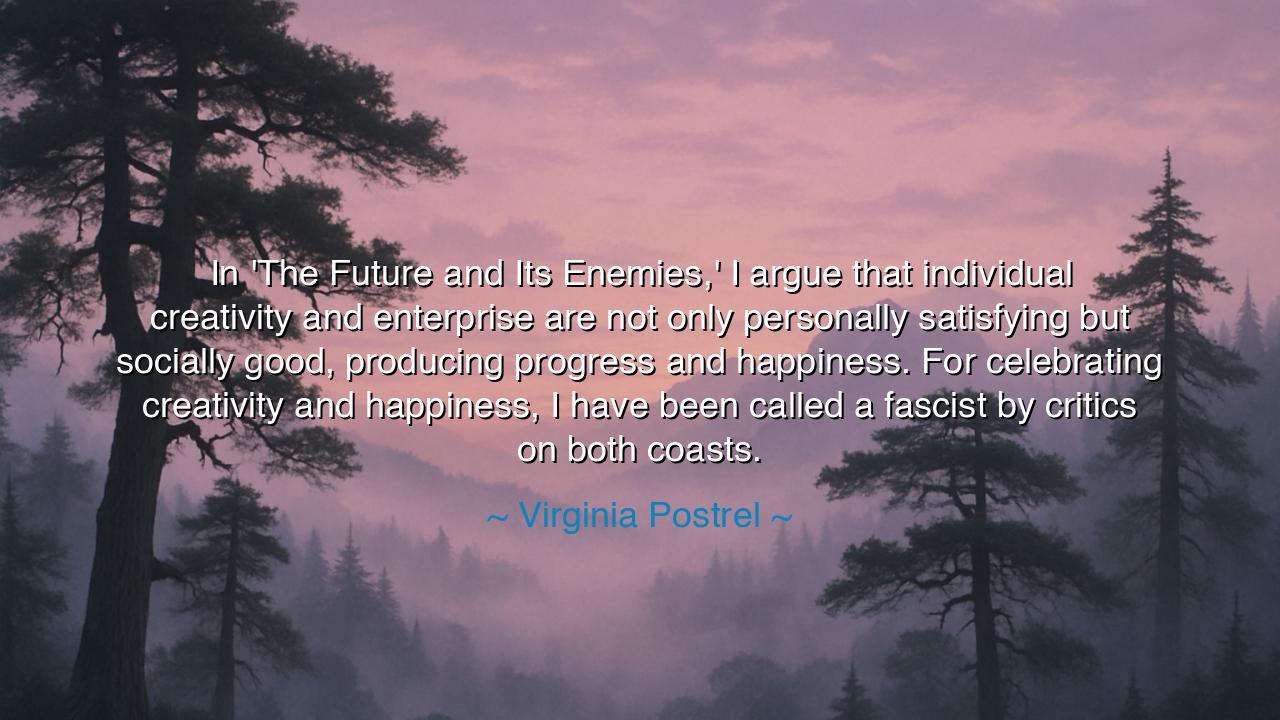
In 'The Future and Its Enemies,' I argue that individual
In 'The Future and Its Enemies,' I argue that individual creativity and enterprise are not only personally satisfying but socially good, producing progress and happiness. For celebrating creativity and happiness, I have been called a fascist by critics on both coasts.






In the words of Virginia Postrel, “In ‘The Future and Its Enemies,’ I argue that individual creativity and enterprise are not only personally satisfying but socially good, producing progress and happiness. For celebrating creativity and happiness, I have been called a fascist by critics on both coasts.” These words, though wrapped in irony, reveal a deep and ancient struggle — the tension between freedom and fear, between the spirit that creates and the spirit that condemns creation. Postrel speaks as one who defends the sacred fire of individual creativity, a force that drives not only personal fulfillment but the forward motion of civilization itself. Yet, as in all ages, those who kindle light are often accused by those who dwell in the safety of shadow.
At its heart, this quote springs from Postrel’s book, The Future and Its Enemies, where she divides the world into two camps: the “stasists,” who cling to order and control, and the “dynamists,” who embrace change, innovation, and uncertainty. In ancient terms, this is the eternal battle between those who fear the unknown and those who dare to shape it. Her declaration that creativity and enterprise are “socially good” is more than a defense of capitalism or invention — it is a hymn to the power of human imagination as a moral force. To create is to affirm life itself. To build is to believe in tomorrow. And yet, she shows us that even the celebration of joy and progress can be twisted by misunderstanding — for the crowd often mistrusts the dreamer.
The ancients knew well this pattern of persecution. Consider the story of Prometheus, who stole fire from the gods to give to humankind — an act of creation, of empowerment, of progress. He did not seek power for himself but freedom for others. Yet for this gift, he was bound to a rock and punished eternally. Such is the fate of those who bring new light into the world: their innovation threatens the old order, and fear rises to call them monstrous. Postrel’s lament — that for praising creativity she was called a fascist — is the modern echo of this myth. Those who misunderstand her mistake vitality for vanity, progress for oppression, freedom for chaos. It is the tragedy of the ages that the liberator is so often mistaken for the tyrant.
And yet, from this contradiction arises a greater truth: societies progress only through the courage of the misunderstood. The builder, the artist, the thinker — all must endure ridicule and misjudgment, for they walk roads the world has not yet seen. Postrel reminds us that individual enterprise, when guided by purpose and vision, does not tear the social fabric but strengthens it. The joy of creation, far from being selfish, spills outward, enriching others, opening possibilities, and teaching that happiness is not a scarce resource but a flame that multiplies as it spreads.
In every age, there are those who fear change — who mistake the chaos of creation for destruction. The ancient Romans derided early Christians as heretics; medieval scholars scorned Galileo for daring to look to the heavens; innovators like Ada Lovelace and Nikola Tesla were dismissed as eccentrics, their genius doubted until long after their time. Yet through their defiance, humanity ascended. Their work reminds us that the future belongs not to the cautious, but to the courageous, to those who dare to create when it is easier to conform, to love progress even when the world punishes them for it.
Postrel’s words carry both pain and triumph. They remind us that happiness born of creation is not universally celebrated — and yet, it is essential. The human spirit is not meant to stagnate. We are not keepers of stability, but seekers of possibility. To embrace creativity is to accept risk, misunderstanding, and even scorn. But it is also to participate in the eternal act of becoming — the transformation that has carried our species from the cave to the stars. Those who condemn joy as vanity, or invention as arrogance, have forgotten that everything they cherish — their homes, their art, their freedom — was once the wild dream of a single dynamist soul.
So let this be the lesson to those who walk in the path of vision: do not fear the scorn of the stagnant. When the voices of the fearful rise against you, remember that every new dawn once looked like chaos to those who worshipped the night. Create, build, imagine — not only for yourself, but for the generations to come. Let your happiness be an act of rebellion, your creativity a form of devotion to life itself. For as Postrel teaches, progress and happiness are not sins to be punished — they are the lifeblood of civilization, and to live by them is to honor the divine spark that resides in every human soul.
And thus, O listener, remember: the world may call you dangerous for celebrating what is beautiful, but danger to decay is the very definition of growth. Hold fast to your creativity. Defend your joy. For though the critics may call it arrogance, time will reveal it as courage — the same courage that has carried humankind, step by step, toward the light of its own unfolding destiny.






AAdministratorAdministrator
Welcome, honored guests. Please leave a comment, we will respond soon